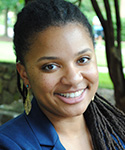August 1st, 2016
Four-Oh-Wunk
April Edwards, MD

April Edwards, MD, is the 2016-17 Chief Resident for the Internal Medicine/Pediatrics program at the University of North Carolina School of Medicine.
I’m April, and I’m the incoming PGY-5 Chief for the Internal Medicine and Pediatrics Residency in Chapel Hill, North Carolina. Just last month, I had my 4th graduation from something since I finished high school.
Residency, it turns out, is long and hard. I’ve spent tons of hours practicing the art of sphincter control each time that I am the Code Team leader. I’ve done chest compressions and placed central lines in patients of all sizes. I’ve interpreted radiographic films on the fly and had innumerable conversations with families of critically ill patients when they are at their most vulnerable. I’ve had patients thank me, when I felt I didn’t deserve it, and others scream their frustrations at me, when I probably did. All of this is the experience you accumulate via the many lives with whom you intersect during residency.
What I seem to have missed in all of this, somehow, is becoming an actual grown-up. To re-frame, I effectively have just graduated from 24th grade. In some ways, it would seem that I have literally done NOTHING in life besides be in school/training. I am excellent at passing innumerable tests by the skin of my teeth, and enduring and possibly even thriving in increasingly intense environments on decreasing amounts of sleep. But I seem to have somehow missed the memo on how to financially “Adult.”
This was all been brought to my attention rather acutely during a so-called “senior pearls” session by one of my attendings at the end of last year. In it, she recommended heeding the advice of your Financial Adviser at this juncture and likely increasing both your Disability Insurance coverage and your Life Insurance. I glanced nervously around the room at the faces of my peers as she said this, and I tried to comprehend the completely foreign phrases “Financial Adviser,” “Disability Coverage,” and “Life Insurance.” The attending might as well have been speaking Dothraki. (Also, as a public service announcement, apparently it’s not “Four-oh-Wunk”, it’s just 401k).
How did this happen? How am I able to be in charge of people’s lives, and of the lives of those they hold most dear, and yet seem to have no actual handle on how the fiscal world and personal finances work — for me or my patients. Don’t get me wrong — I have been trained well by incredible physicians and teachers. And our public institution prides itself in providing the highest level of care to all comers, regardless of context. I have been taught to have poise in myriad challenging situations and to keep my cool under pressure. I am even headed toward a career in Critical Care after my Chief Residency. (Hopefully. Someone, please read my ERAS application.) But it would seem that there are a few things that I missed in between my call shifts.
What does this mean for our current medical trainees? I am likely an extreme version of one flavor of missed information, but, in my new role as chief, I have become aware that this does not occur in a vacuum. Other trainees have similar or related difficulties in non-medical knowledge. Which gets at the bigger question — how do we address the “Hidden Curriculum” for medical trainees?
People who go into medicine are great with data. They can store it and interpret it. They are quick learners. But what are we missing? The hole in my personal knowledge has made me think about what most people expect a physician to know/do and about how physicians are expected to behave, and whether my training has adequately addressed all of those things.
Others have alluded in this Blogsphere, to the related, although distinctive, issues of Burnout and Professionalism. These are things that I anticipate become even more familiar now that I’m in a resident supervisory position. Examples: one resident can make vent changes based on a blood gas but is brusque, stiff, and distant while delivering bad news. One can efficiently put in orders for a PICC line and the appropriate accompanying antibiotics but be short or even blatantly rude to nursing staff. Another always remembers to have her patients fill out PHQ-9s at their clinic appointments but fails to recognize the signs of depression/anxiety in herself that affect her own work.
All of this is to say, although residency training has certainly evolved since the Flexner report, we still have a lot of work to do. As I transition from residency to my next chapter, I am trying to be more attentive to this problem. The QI initiative posters I previously skipped because they weren’t about “science” are the ones displaying the work of people trying to combat this from the inside. We have to start early. These topics aren’t things we can cram into a module to be completed in between your OSHA certification and lunch. Nor can they be expected to be taught entirely before residents enter the “real world.” These are things that matter from the beginning and they must be taught from the beginning.



Graduation makes you a “graduate” – not an accountant, physician or mechanic. For that you need the meta learning – some were “doctors” before they entered medical school – some never became one after they left medical school. We shape ourselves – or fail to do so. Mentor’s assist a lot – but basically it’s a DIY (do it yourself) thing.
This is an elegant description from the inside- don’t forget your other roles – woman, wife, mother, leader, financially responsible person, etc and so forth . . .as selected by you. You have to claim these roles- they can’t be “awarded”.
Best of luck.
Thank you, this is an outstanding piece.
Medicine has a long tradition of immaturity – just look at “The House of God…”